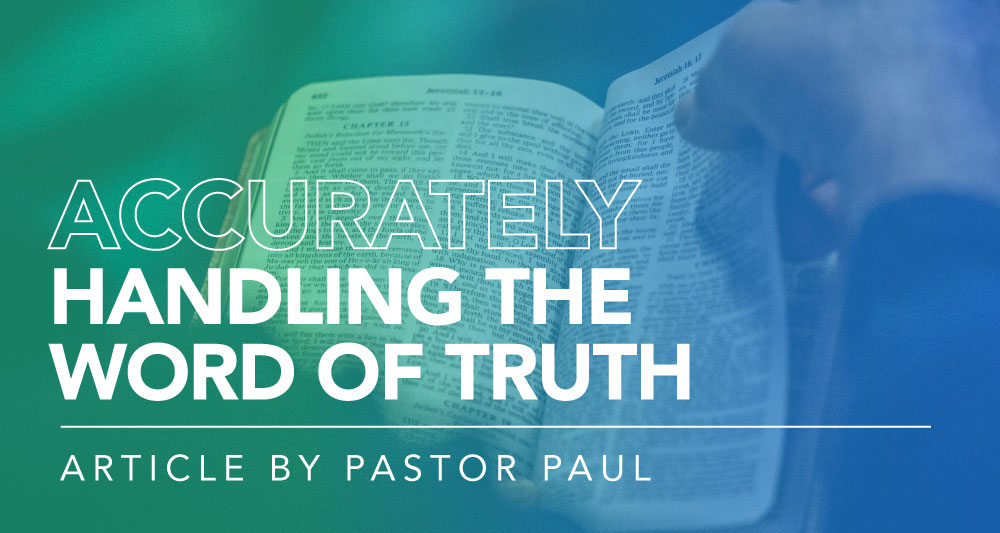Paul’s weekly newsletter article – 07/29/22
Be diligent to present yourself approved to God as a workman who does not need to be ashamed, accurately handling the word of truth. (2 Tim. 2:15 – NASB95)
The epistle of 2 Timothy was the last letter that the Apostle Paul wrote before he died. Some have called it his swan song. He knew his time was short, so he used it to give final instructions to a young preacher named Timothy so he could pass them on to others (2 Tim. 2:2). For years, Paul had been training Timothy in every aspect of life and ministry. I can’t imagine the emotions Timothy felt as he read of Paul’s sufferings for Christ (1:8, 12; 3:10-12) and impending death. Paul doesn’t avoid mentioning the way he has been mistreated and abandoned by others (2 Tim. 4:6). But his focus throughout the letter is on the Gospel (1:8-14) and the critical importance of teaching the Word of God (1:13-14; 2:24-26; 3:14-17; 4:1-5).
Last week I wrote to you about being steadfast, immovable, always abounding in the work of the Lord, knowing the Lord will see all that we do for Him and reward it for eternity (1 Cor. 15:58). The specifics of that will be different for all of us. For the past 45 years it has been my privilege to study and teach God’s Word. Recently, a young preacher asked me about preparing to preach. I told him that the process is exhausting and will stretch him intellectually, physically, emotionally, and spiritually, but it will be lifechanging both for him and for those whom he teaches. Below are a few things I have shared with people who have asked similar questions about preparing to teach or preach.
Start with prayer. As we have been studying in 1 John 2, we need the Holy Spirit to open our eyes to understand and apply God’s truth (1 Cor. 2:11-14). We need to pray before, during, and after we study God’s Word. We need to seek to know what God said, what He meant by what He said, and how He wants us to apply what He said. Too many people approach the Bible trying to find a verse that agrees with what they already believe. They impose their preconceived ideas and favorite doctrines on passages of Scripture. But we must come before the Lord in humility asking Him to enable us to accurately handle His truth.
Study for your own growth first. It is easy to simply study so that we can teach others, but the Lord wants us to personally apply His truth to our own lives first. Ezra 7:10 says, “For Ezra had set his heart to study the law of the Lord and to practice it, and to teach His statutes and ordinances in Israel.” There will always be a gap between how much we know and how much we apply consistently, but teachers of God’s Word must seek as much as possible to apply what they have studied to their own lives before they teach others (2 Tim. 3:16-17). When that happens, they will be able to teach both by precept and by example.
Devote TIME to study. Teachers must say “no” to good things that others are doing to prioritize the study of God’s Word. For the lay teacher it may require getting up very early, staying up late, choosing not to watch TV, etc. Even for paid pastors, we only have so much time each week and it is critical to block out uninterrupted time to prioritize study.
Go as deep as possible in your study. Again, we will have different limitations on time, but we must come to a proper understanding of God’s truth before teaching. One person said, “A mist in the pulpit is a fog in the pew.” Another man told me, “One step beyond complexity is simplicity.” Many of our hearers will find the Bible complex and confusing. We are separated from the original authors by time, language, geography, and culture. It is our task to bridge those gaps so that our hearers understand what the authors meant by what they said.
Utilize bible study resources. We are so blessed at this point in history to have numerous resources available to us (libraries, videos, podcasts, sermon transcripts, radio & TV programs, etc.). These resources enable us to dive into the history, geography, and original languages of the Bible. They also expose us to the best Bible teachers throughout history. And we have so many resources available in the LOGOS bible software we provided for you for free. LOGOS is the primary resource I use every week in preparation for sermons. I have over 4,000 books in my version which can be accessed in fractions of a second to find answers to questions I may have about a specific text of Scripture.
What resources do I use to study 1 John?
· English text. Read it over and over and over in English asking questions of the text. Read various translations (NASB95, ESV, NKJV, KJV, NLT, Wuest’s Expanded, etc.).
· Greek helps. LOGOS has great interlinear versions of the Bible that tell me everything I need to know about specific words, definitions, cross-references, etc. Beyond that I use Robertson’s Word Pictures, Vincent’s and Wuest’s Word Studies, Vine’s Dictionary, Theological Dictionary of the NT, etc. Each of those give different nuances to specific words and phrases that can help tremendously with proper translation and interpretation.
· Study Bibles. They have succinct explanations of specific passages along with maps, book overviews, outlines, etc.
· Commentaries. I turn to these AFTER I have studied the text on my own. They either confirm or challenge my conclusions. If I come up with an interpretation that no one else has, I proceed with great caution. Because I have time, each week I read 30+ commentaries on the text I am studying. I gain insights into the text and find out where popular preachers get most of their material. If you want to study along with me, my favorite commentators in 1 John include: D. Martyn Lloyd-Jones, D. Edmond Hiebert, Colin G. Kruse, John Phillips, James Montgomery Boice, David L. Allen, Simon J. Kistemaker, Steven Cole, John Calvin, and John MacArthur. Commentary series: Expositors, Tyndale Concise, and Bible Knowledge.
· Other Preachers. Very helpful not only for interpretation, but for illustrations and applications. Most popular preachers have sermons you can listen to online, and many have sermon transcripts so you can look up specific verses more quickly. The well-known pastors: Alistair Begg, John MacArthur, Charles Swindoll, and David Jeremiah. Some friends of mine who are not as well-known but are exceptional expositors include: David Hegg, Philip De Courcy, and Tom Pennington.
The Apostle Paul’s final charge to Timothy was to be a defender of the Gospel and a diligent student of and teacher of the Word of God. We all have that same calling whether our teaching is for young or old, a few or a few thousand. God promises rewards to those who are steadfast, immovable, always abounding in His work. I am on vacation right now because of a need for rest. Since my heart surgery I have struggled a bit with fatigue and brain fog. Since getting Covid in late May the fatigue and brain fog increased. I truly want to be diligent to study, apply, and teach God’s Word faithfully until my time is up. Please pray that the Lord would refresh Diane and me physically, mentally, emotionally, and spiritually, and that we would come back in mid-August with renewed passion to fulfill our ministry.
14 Therefore, beloved, since you look for these things, be diligent to be found by Him in peace, spotless and blameless, 15 and regard the patience of our Lord as salvation; just as also our beloved brother Paul, according to the wisdom given him, wrote to you, 16 as also in all his letters, speaking in them of these things, in which are some things hard to understand, which the untaught and unstable distort, as they do also the rest of the Scriptures, to their own destruction. 17 You therefore, beloved, knowing this beforehand, be on your guard so that you are not carried away by the error of unprincipled men and fall from your own steadfastness, 18 but grow in the grace and knowledge of our Lord and Savior Jesus Christ. To Him be the glory, both now and to the day of eternity. Amen.
(2 Pet. 3:14-18 – NASB95)

